
You probably know that many people turn to food when they’re feeling stressed. What you may not know is that science has proven some foods are actually excellent stress-reducers. The trick is to pick the right foods. Sure, high sugar treats may make you feel better for an hour or so, but then your blood sugar will crash and you’ll feel more fatigued and stressed than before. Instead, choose healthy foods that not only nourish your body, but relax your muscles and nerves.
Magnesium and its fellow macronutrient, calcium, act together to help regulate the body's nerve and muscle tone. In many nerve cells, magnesium serves as a chemical gate blocker - as long as there is enough magnesium around, calcium can't rush into the nerve cell and activate the nerve. This gate blocking by magnesium helps keep the nerve relaxed. If our diet provides us with too little magnesium, this gate blocking can fail and the nerve cell can become over activated. When some nerve cells are over activated, they can send too many messages to the muscles and cause the muscles to over contract. This chain of events helps explain how magnesium deficiency can trigger muscle tension, muscle soreness, muscle spasms, muscle cramps, and muscle fatigue.
✮ Relax your nerves and muscles
✮ Build and strengthen bones
✮ Keep your blood circulating smoothly
✮ What events can indicate a need for more high-magnesium foods?
✮ Muscle weakness, tremor, or spasm
✮ Heart arrhythmia, irregular contraction, or increased heart rate
✮ Softening and weakening of bone
✮ Imbalanced blood sugar levels
✮ Headaches
✮ Elevated blood pressure
Avoid overcooking to minimize loss of magnesium.
Selenium deficiencies are scientifically linked to stress. Nuts of all kinds are high in selenium, making them a perfect de-stressor. Remember this rhyme: Just a handful of nuts a day will help you keep stress at bay.
Magnesium is proven to relax muscles and nerves, preventing muscle tension, fatigue, and over-excitement. Basil and spinach are both great sources of magnesium; basil also contains anti-inflammatory and anti-bacterial properties, making it a terrific choice not only for flavoring meals but for keeping you feeling less stressed. For best results, add a handful of fresh basil leaves toward the end of the cooking process, or eat one cup of fresh or a half a cup of cooked spinach each day. Be sure to also check out these basil recipes on video. Chocolate, Chicken, Eggs, and Milk Chocolate, chicken, eggs, and milk are proven de-stressors. Each is full of tryptophan, an essential amino acid that’s used to create serotonin in body – a chemical that’s well known to cause relaxation and feelings of pleasure. If you choose chocolate, however, stick with dark chocolate, since it’s lower in sugar. Beans & RiceRice and beans are both complex carbohydrates, which are known to increase the body’s absorption of tryptophan – which your body turns into serotonin, a mood enhancer. It’s important, however, to steer clear of white rice, which may spike your blood sugar, leading to a low feeling hours after eating.
✪ Depression
✪ Anxiety
✪ Irritability
✪ Impatience
✪ Impulsiveness
✪ Inability to concentrate
✪ Weight gain or unexplained weight loss
✪ Slow growth in children
✪ Overeating and/or carbohydrate cravings
✪ Poor dream recall
✪ Insomnia
Tryptophan is one of the 10 essential amino acids that the body uses to synthesize the proteins it needs. It's well-known for its role in the production of nervous system messengers, especially those related to relaxation, restfulness, and sleep.
Tryptophan has two important functions. First, a small amount of the tryptophan we get in our diet (about 3%) is converted into niacin (vitamin B3) by the liver. This conversion can help prevent the symptoms associated with niacin deficiency when dietary intake of this vitamin is low.
✪ Sea lion, kidney (Alaska Native) Tryptophan: 2580mg
✪ Sea lion, meat with fat (Alaska Native) Tryptophan: 1322mg
✪ Game meat, elk, cooked, roasted Tryptophan: 746mg
✪ Seaweed, spirulina, raw Tryptophan: 739mg
✪ Spinach, frozen, chopped or leaf, unprepared Tryptophan: 690mg
✪ Soy protein isolate, potassium type Tryptophan: 685mg
✪ Egg, white, dried, powder, glucose reduced Tryptophan: 673mg
✪ Soy protein isolate Tryptophan: 660mg
✪ Seeds, sesame flour, low-fat Tryptophan: 659mg
✪ Soy sauce made from soy (tamari) Tryptophan: 603mg
✪ Fish, halibut, cooked, with skin (Alaska Native) Tryptophan: 593mg
✪ Crustaceans, shrimp, lobster, mixed species, cooked, moist heat Tryptophan: 588mg
✪ Quail, breast, meat only, raw Tryptophan: 576mg
✪ Pork, fresh, variety meats and by-products, pancreas, cooked, braised Tryptophan: 571mg
✪ Goat, raw Tryptophan: 561mg
✪ Watercress, raw Tryptophan: 545mg
✪ Duck, young duckling, domesticated, White Pekin, breast, meat only, boneless, cooked without skin, broiled Tryptophan: 543mg
✪ Fish, Salmon, Chum, raw (Alaska Native) Tryptophan: 516mg
Second, tryptophan serves as a precursor for serotonin, a neurotransmitter that helps the body regulate appetite, sleep patterns, and mood. Because of its ability to raise serotonin levels, tryptophan has been used therapeutically in the treatment of a variety of conditions, most notably insomnia, depression, and anxiety.
Soup is the best food you can take to relax. Chicken stock is the best option since it makes your body get rid of many infections and other foreign bodies. You can also add vegetables like tomatoes, green chili, spring onion, capsicum and garlic for calming effect on your nervous system. Prefer hot soups over colder ones and those having thin consistency rather than thick pasty ones.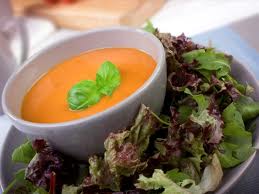
Milk is another beverage that can help you relax, the reason behind taking it at bed-time. If you need a quick calming effect, reach out for a glass of warm milk. Warm milk is known to contain tryptophan –a compound which helps in the production of serotonin (around 43%). Serotonin is known to induce a feeling of pleasure along with helping in sleep. You can always take in cold milk during the day to avoid drowsiness for cold milk is still rich in calcium which also induces calmness. All milk products including ice cream have the same effect but they must be low in sugar content.
Just like milk, eggs are a source of amino acids packed with tryptophan which is a relaxing brain chemical. Make sure you include eggs in your diet either in breakfast or as a snack (boiled egg).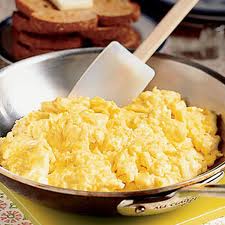
Cheese being classified as a protein source has the same calming effect on your brain as of milk or eggs. Choose cheese types which are high in protein (contains tryptophan ) like Cottage , Cheddar, Gruyere, Swiss , and Ricotta varieties. Next time you’re making a sandwich, don’t forget to layer some shredded cheese in it.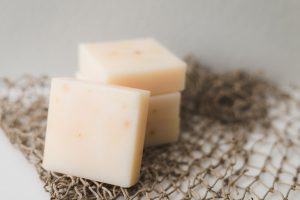
Honey in its natural non-additive form is high in tryptophan to relax the body. Along with tryptophan, the potassium in honey has a soothing effect on brain and nerves. Potassium works against excessive acids and stress hormones to relax our nervous system. Research has also shown that glucose in honey interferes with orexin (a neuro-transmitter) which helps in keeping you alert. So, make sure you add a spoonful of honey to your cereals, milk, or as a spread in your sandwich!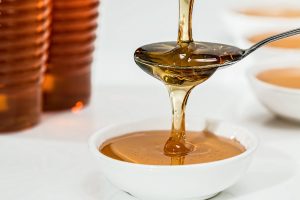
Being complex carb, brown rice simulates the release of insulin, which helps sleep-inducing amino acids enter the brain and produce sleep-inducing substances such as serotonin and melatonin. Same is the function of all other complex carb foods like unrefined grains including oats and wheat, wholegrain pasta, and legumes. The result is a sound sleep, or at least you start feeling relaxed and calm.
Nuts are rich in magnesium, selenium, zinc, vitamin E and vitamin B-complex that help relax the brain when taken in large quantities. Peanuts and pumpkin seeds are rich in magnesium but peanuts also have high sodium content which is why they are not good for your health when taken in large amount. Peanut butter is a good alternate which contain both magnesium and vitamin B6. Deficiency of magnesium leads to mental retardation while deficiency of selenium has been linked to increased depression and anxiety. Brazil nuts are rich in selenium in zinc, and just a handful is enough to fulfill your RDA intake. Almonds, sesame seeds and sunflower seeds are rich in tryptophan which helps producing serotonin. Almonds are also rich in vitamin E which helps rebuild the cellular damage caused by stress and anxiety. Walnuts are also rich in magnesium, vitamin B and zinc –all the essential relaxing ingredients. So make sure to keep a blend of these nuts at hand.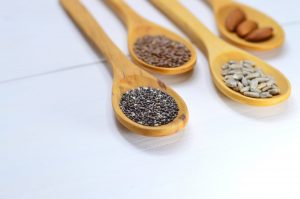
Seafood is rich in magnesium, zinc and selenium, and has the same effect on our nervous system as of nuts and seeds (include tryptophan naturally). Halibut is high in magnesium. Tuna, cod, salmon, shrimps and lobsters are high in selenium content, though not nearly half as much as nuts. Tuna and salmon are known to fight stress hormones in our body. Omega-3 (a fatty acid) is also known to fight stress and help you relax since it triggers brain to produce calming hormones. Salmon, mackerel, trout, tuna, and sardines all are rich in omega-3 compound. You can also take in omega-3 through capsules in the form of cod liver oil if seafood is not available.
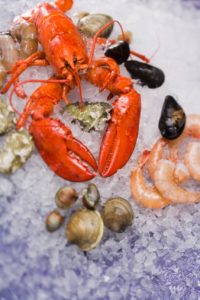
Dark chocolate just like other foods is rich in tryptophan, which helps manufacture serotonin, the relaxing compound. It is also known to boost the endorphin and dopamine (amino acids) levels in the brain that result in enhanced mood. Research has proven that eating a small amount of dark chocolate daily can lower the level of stress hormones in your body. So eat your chocolates but beware they are low in sugar content and high in cocoa content (around 30:70 ratio).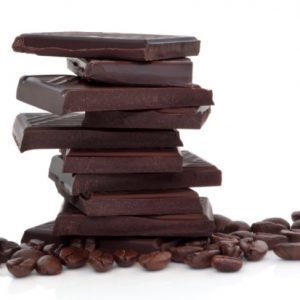
Some vegetables high in magnesium have a relaxing effect on body like other magnesium-rich foods. Spinach has very high magnesium content and it’s also a good source of vitamin C (another relaxing agent). To keep yourself stress-free, take a cup of fresh spinach leaves or half a cup of cooked spinach. Broccoli also helps you relax for it is high in potassium and vitamin C, so don’t forget to include it into your salads. Peppermint is another vegetable/herb which due to its high magnesium content relaxes brain and helps you more focused. It also reduces the stress associated with muscular cramps and intestinal gas. So keep a fresh peppermint juice or fresh mint leaves at hand to pop into your mouth during work.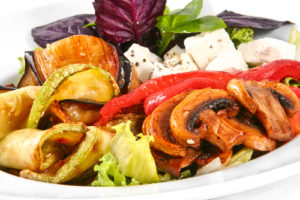
Tea has been used as a relaxant for a long time throughout the world. You can choose either from black, green, or other herbal teas to relax. Black or green tea leaves are rich in L-theanine (an amino acid) which contains two sedative flavonoids: apigenin and chrysin . Other herbal teas known to reduce stress and anxiety include basil, lemon balm, valerian and chamomile. Chamomile tea has been proven to reduce anxiety and panic in people suffering from generalized panic disorder, but may not be good for pregnant women.
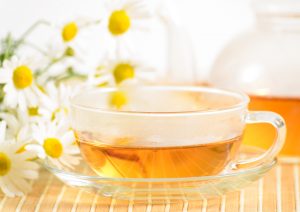
Fruits rich in vitamin C are the most relaxing among others for vitamin C in fruits helps in converting tryptophan into serotonin. The list of such fruits is quite long: Strawberries, kiwi fruit, dried dates, figs, papaya, cherries, oranges, guava, mangoes, pineapple, berries, grapefruit and bananas all are rich in vitamin C. Study has shown that an intake of 1,000 mg vitamin C lowers levels of stress hormones in body. So, next time you need to relax, take a bowl full of fruits!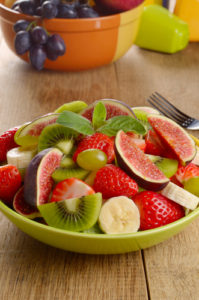
Help regulate your appetite
Help you sleep better
Elevate your mood
Resources: the conscious life.com, livestrong.com, active.com
